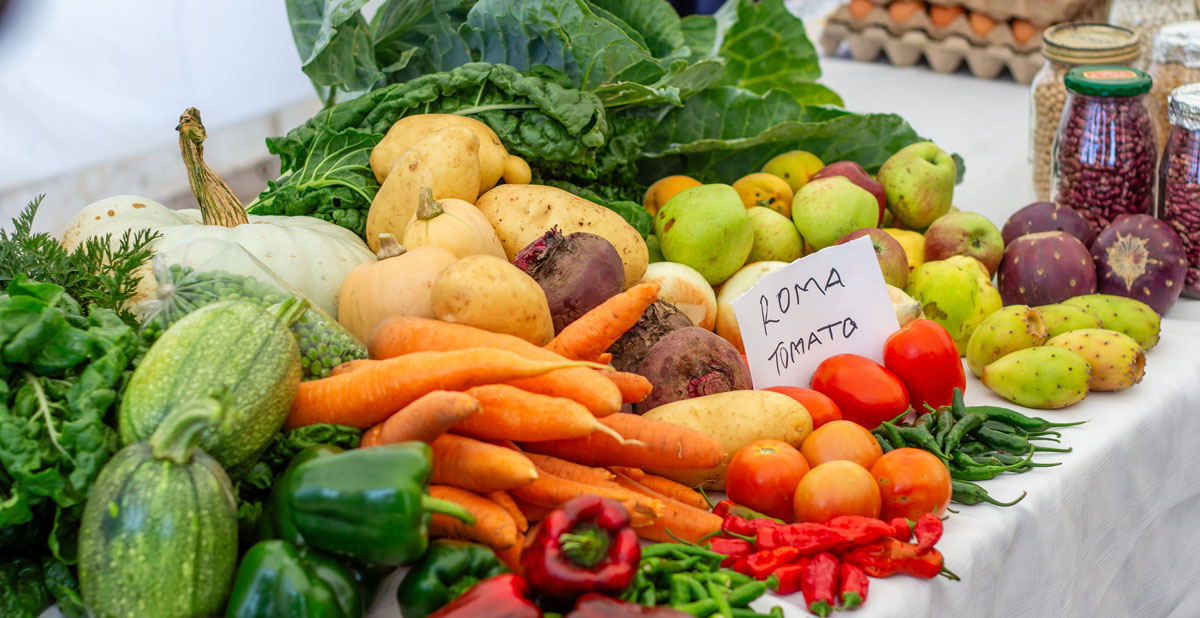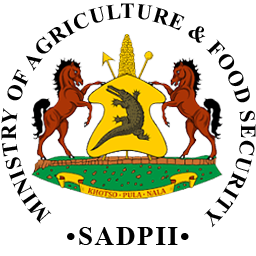- SADP II
- Improving Agricultural Commercialization and Nutrition
Improving Agricultural Commercialization and Nutrition
IMPROVING AGRICULTURAL COMMERCIALIZATION AND NUTRITION
Component 1 aims at strengthening the adaptive capacity of smallholder farmers to adjust and modify their production systems to minimize the potential future impacts from climate variability. The overall goal is to enhance climate resilience through solutions that improve soil health, increase water use efficiency, and increase farm productivity and crop diversification. The component focuses on: (i) scaling-up the adoption of climate-smart agriculture technologies by farmers and enhancing farm management practices aimed at improving soil health, water-use efficiency, crop diversification, and farm productivity.

Sub-component 2.1: Support for Horizontal Alliances
The project supports the formation of newly established as well as strengthen the existing farmer groups in Lesotho’s agriculture sector. The multi-fold benefits of horizontal alliances, including, inter alia, sharing of market information, building economies of scale for input supply, product assembly, transport, packaging and storage as well as effective capacity to negotiate and enter into supply agreements with off-takers enable farmers improve their on-farm productivity as well as enhance their opportunities to access markets. Special attention is accorded to the needs and interests of women and youth (defined as people under 35 years of age).
Where feasible, the formation and strengthening of horizontal alliances drawn on the Smallholder Horticulture Empowerment Project (SHEP) approach developed by the Japan International Cooperation Agency (JICA). This approach shifts smallholder thinking from subsistence farming to farming as a business by training farmers to conduct their own market surveys to identify local crops with potential for commercialization; training them to grow these crops profitably; organizing stakeholder forums to exchange information with other like-minded farmers, input suppliers and potential buyers; and by helping them to build good relations with these market agents.
The formation and strengthening of horizontal alliances will be facilitated by an NGO or business developme nt service that has extensive experience of group dynamics and familiarity with the culture and ethos of Basotho farmers. The TA and training financed will include inter alia basic accounting and financial management, governance, business management, procurement.
Market linkages will be built through supply contracts between producers and buyers or aggregators, which specify the volumes to be traded, quality requirements, delivery mechanisms and prices. Progress on the linkages will be monitored as part of the project MIS during the period of grant payments (3 instalments), and thereafter be follow-up through periodic surveys. These contracts will also allow for surplus production, over and above the contracted amount, to be sold elsewhere for additional income. Where aggregators/buyers have adequate scale and resources, supply contracts will also provide for input provision, seasonal finance and extension advice. Less formal VC links based on good communication, continuous commercial interactions and trust will be built where aggregators and/or suppliers lack the capacity to benefit from formal contractual relations. Key value chain actors will benefit from study tours to regional enterprises with advanced knowledge of and experience with handling and processing VC commodities at similar scale
An NGO is contracted under the project to work with farmers and agri-enterprises to build capacity at all points along the value chain, foster and strengthen linkages between Value Chain actors, broker contracts and improve business management. The service provider will have a sound understanding of the productive alliance approach, farming sector in Lesotho, wide experience with value chain development and a good understanding of local and regional markets. All grant applicants would be required to undertake this training which will be included as a criteria of grant screening. This will ensure viability and quality of the investment financed. This training will also be provided to extension staff (training of trainers) so that to enable them to continue such training beyond the life of the project.
Planned Activities
-
Training of farmers and extension in Agri-business management
and group formation -
Round table meetings
-
Trade fairs
-
Market information disseminations
-
Study tours for farmers
Key Achievements
- 101 Extension officers trained in Agri-Business in all districts.
- 4279 (2031M, 2248F) farmers trained on agri-business and marketing skills
- 664(291M, 373F) farmers trained in group formation and dynamics in all districts.
- 36 buyer seller meetings for farmers and traders (off-takers and input suppliers) were conducted in all districts with intention of forming alliances between buyers and sellers.
- 13 market information sessions were held in all districts except Berea for sharing of market trends information in terms of imports to inform production decisions.
- One National Market Day was held in Maseru with aim of promoting sustainable agri-business and more than 1070 people participated. Producers generated sales of more than M128,000.
Sub-component 2.2: Support for Horizontal Alliances
The sub-component seeks to leverage private investments for the development of a more commercially oriented agriculture sector. It supports commercial and semi-commercial off-takers (micro-, small- and medium agro-enterprises) to drive their operations towards more lucrative domestic and export markets while simultaneously providing smallholder farmers that dominate Lesotho’s rural landscape opportunities for increasing agricultural productivity and improved livelihoods. Through the provision of technical assistance and grant financing, the project facilitates the implementation of productive partnerships between farmers (both aggregated and individual) and off-takers. Such productive alliances incentivize smallholder farmers to raise productivity and marketed surplus and assists agri-business enterprises to expand into domestic and export markets based on a more secure supply of raw materials and quality produce/products. This is achieved through two matching grant programs:
Smallholder farmers have access to matching grants to finance investments for increasing on-farm productivity in high potential Value Chains including horticulture, potatoes, dairy and small-scale pig, agro processors and poultry. Investment support includes the financing of, inter alia, small farm implements and equipment, climate adaptive technologies such as shade nets, tunnel houses, drip irrigation and water storage equipment, improved seed varieties and seedlings, improved livestock breeds, agro-processing equipment, packaging equipment, and storage – where these investments lead to increased production and marketed surplus for the selected value chains. Maximum grant size be limited to $US30,000/applicant (individual or group). Grants will require an average of 20 percent equity contribution. Based on experience with original SADP, in-kind equity contributions will not be considered as they are difficult to measure and verify. The equity contribution has been kept low to compensate for this restriction. In addition to a viable business plan and a cash equity contribution, the group will also have to demonstrate that it has been operating for at least 12 months and that it has independently implemented other activities to achieve group objectives. Under this window, there will be a quota of 30% youth and of 50% women
Commercial farmers, aggregators, processors and other business enterprises involved in the project value chains have access to matching grants to facilitate investments in postharvest infrastructure and management, including upgrade or construction of processing facilities, cold storage equipment, alignment with international health and safety standards, calibrating/sorting/grading machines, packaging, product development etc. Grant size ranges from $US30,000 to $US100,000. All grants under this program require an equity contribution, in cash, of 30 percent of the total value of the investment. Applications for the agri-enterprise grant program need to estimate the quantity and quality of raw materials they are seeking from farmers and express a clear commitment to building good business relations with farmer suppliers. They also provide an estimate of the direct employment their investment generates. Those with viable business plans are screened to assess the extent to which their investment proposals will drive commercialization by farmer suppliers and the level of direct employment generation. The selection criteria for beneficiary agri-business enterprises include: a viable business plan for expansion, a clear commitment to source raw materials from local farmers, and a willingness to build effective commercial relationships with smallholder suppliers. Start-up enterprises are not eligible for project support.
(i) an orientation phase where young applicants visit a number of successful farmers (the mentors) engaged in different types of activities (this is prior to the business training program);
(ii) support to development of the matching grant proposal, followed by
(iii) continuous mentorship by one of the mentors engaged in the activity of choice (this is after receiving the grant, to support the youth in starting their activities). The incubator activities will be oriented by the agribusiness youth incubator guideline developed by the international umbrella service provider.
Agribusiness incubation aims to provide the youth with balanced, practical experiential learning; it also provides business development, market access, technology transfer, and financial services that are backstopped through mentorship and networking. A unique feature of this model remains its systemic approach to development where synergy is built by developing and leveraging interactions between not only the primary production units but also between the primary production, secondary (agro-processing and machine production etc.), and tertiary services. The value-chain logic permeates the entire model and represents the main element that guarantees resilience and sustainability
The requirements to identify suitable incubators include
(i) ongoing operations in the specific value chains,
(ii) clear linkage from the business operation to higher-value and higher-volume off-takers,
(iii) clear linkage from the business operation to reliable service and input suppliers, and
(iv) willingness to mentor others. In SADP-II, incubators should ideally be selected from the successful SADP grantees.
The role of mentors will be to:
i) offer an overview of their activity to aspiring young grant applicants to help them choose their income-generating activity;
ii) support in developing a matching grant proposal and business plan,
(iii) offer hands-on training on their farm to a group of youth (10 to 20 members per group) after they received a grant ;
iv) make individual visits to young grantees on their farm. The cost of the services provided by the mentor will be a standard cost included in the grant proposals for youth and paid for from the grant.
Planned Activities
-
Training of service providers
-
Matching grants for improving smallholder productivity
-
Matching grants for Agri-businesses
-
Youth Call
-
Engagement of Youth Mentorship Consultant
-
Lead firms engagememt
Key Achievements
- 30 Service providers were trained on proposal writing for Lead Firms.
- A total of M49 229 175.16 disbursed to matching grants beneficiaries for milestone two and three under round one and two
- Under Youth Call, 39 beneficiaries have received milestone one amounting to M3,120,000.00
Sub-component 2.3: Improved Nutrition
Planned Activities
-
Advocacy campaigns on nutrition diets
-
Community based dietary knowledge
-
Nutrition Sensitive Grants
Key Achievements
- In partnership with WFP disseminated Nutrition messages through public gatherings to 34 612 households and translating to 138 448 people reached.
- 44 ATOs - Nutrition trained as trainers on grants management and report writing.
- 104 Nutrition Clubs with 1702 households have been selected for Nutrition Sensitive Grants and to date, 45 nutrition clubs have already received funds for procurement and construction of 3m x 9m shade-nets. Installation of shade-nets with drip irrigation system installed, procured and delivered fruit trees and dual-purpose chickens for 736 households in Thaba-Tseka, Leribe, Berea, Maseru and Mafeteng.



